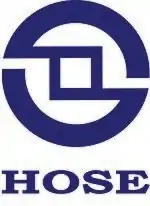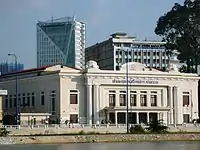Ho Chi Minh City Stock Exchange
Ho Chi Minh City Stock Exchange or Ho Chi Minh Stock Exchange (HOSE or HSX), located in Ho Chi Minh City, is the largest stock exchange in Vietnam. Established in 2000 as the Ho Chi Minh City Securities Trading Center (HoSTC), it is an administrative agency of the State Securities Commission, along with the Hanoi Securities Trading Center. The stock exchange is located at 45-47 Ben Chuong Duong, District 1, Ho Chi Minh City, Vietnam.[3] The current top executive of HSX, with the title of Deputy Chairman, is Mr. Tran Dac Sinh.[4]
| Sở Giao dịch Chứng khoán Thành phố Hồ Chí Minh | |
 | |
 | |
| Type | Stock exchange |
|---|---|
| Location | District 1 Ho Chi Minh City, Vietnam |
| Founded | July 2000 |
| Owner | State Security Commission of Vietnam |
| Currency | Vietnamese Dong |
| No. of listings | 396 (as of 12/4/2018)[1] |
| Market cap | 128.34 billion USD (14/04/2018)[2] 20 trillion VND |
| Indices | Vn-Index VN30 Index VNMID Index VNSML Index VN100 VNALL Index |
| Website | www |
On 18 May 2015, the HoSE joined the United Nations Sustainable Stock Exchanges (SSE) initiative as part the SSE's regional dialogue in Bangkok hosted by the Stock Exchange of Thailand.[5]
History
The Ho Chi Minh City Securities Trading Center (HoSTC) located in Ho Chi Minh City, was officially inaugurated on July 20, 2000, and trading commenced on July 28, 2000. Initially, two equity issues were listed, Refrigeration Electrical Engineering Joint Stock Corporation (REE) and Saigon Cable and Telecommunication Material Joint Stock Company (SACOM).
In the beginning, an overall foreign ownership limit of 20% for equities and 40% for bonds was implemented. In July 2003, in a bid to improve liquidity, the government raised the foreign ownership limit for equities to 30% and totally removed the foreign ownership limit of a particular issuer's bonds. Foreign participants on the Stock Trading Center of Vietnam must register through a custodian licensed to hold securities on behalf of foreigners. Once registered, a securities transaction code is issued to the foreign investor that will permit securities trading.
As of 2006, there are thirteen licensed securities companies. Of these, nine have been licensed to conduct a full range of securities services including underwriting, brokerage, custody, research, portfolio management and trading. The minimum capital required to operate effectively as an investment bank was VND43b (c. US$2.7m).
At the end of 2006, combined market capitalization of both Ho Chi Minh City Securities Trading Center and Hanoi Securities Trading Center is 14 billion US dollars, or 22.7% GDP of Vietnam.
On 8 August 2007, HoSTC was renamed and upgraded to the Ho Chi Minh Stock Exchange. This is the largest stock exchange of Vietnam at the moment.
As of July 2010, there were 247 companies listed on the HOSE with a market capitalization of VND537.4 trillion ($28.28 billion).[6] The exchange had 141 listings in January 2008, including 138 company stocks and three fund certificates, with a total market capitalization of 365.7 trillion dong ($23 billion). Vietnam limits foreign ownership of listed companies to 49%.[7]
On 10 May 2014, HOSE had 342 listings, including 302 stocks, 2 fund certificates and 38 bonds. The total listed volume was 30.415 billion, in which 99.62% were stock shares. The market capitalization was 310.5 trillion VND. On the same date, HOSE's benchmark Vn Index ended 542.46, with the PE ratio of 12.16, the lowest compared to other South East Asia countries. The highest record of Vn Index was on 12 March 2007 at 1,170.67 points.
The HOSE building, located at 16 Võ Văn Kiệt Avenue (đại lộ Võ Văn Kiệt), District 1, Saigon (old address was 45-47 Bến Chương Street (Bến Chương Dương), District 1, Saigon), was originally the Chamber of Commerce (Chambre de Commerce) building during the French colonial era before 1954. After 1955, the building was renamed Hội trường Diên Hồng (Diên Hồng Conference Hall), and was the seat of the South Vietnamese Senate (Thượng viện Việt Nam Cộng hòa) during the Second Republic period (Đệ nhị Cộng hòa) under President Nguyễn Văn Thiệu, from 1967 to 1975.[8][9]
Function
The Stock Trading Center of Vietnam is also the official mechanism through which new government bonds are issued, and it functions as the secondary market for a number of existing bond issues. All securities traded on the Stock Trading Center of Vietnam are denominated in Vietnamese dong (VND). Par value is standardized at VND10,000 for equities and VND100,000 for bonds. Trading is conducted daily with two matching sessions: morning (9 a.m. - 11.30 a.m.) and afternoon (1 p.m. - 3 p.m.).
The State Securities Commission (SSC), a body established formally in 1996, is responsible for capital markets development, licensing of participants, and the issue and enforcement of regulations. A wide range of regulations, with significant input from multilateral bodies such as the International Finance Corporation, have been promulgated, including those dealing with such issues as insider trading, take-over trigger points and margin lending. To be listed, a company must have been profitable for at least 2 years, have a minimum capitalization of VND5b (approximately US$318,000), and have at least 50 shareholders who are not employees of the company, holding at least 20% of stake. Foreign invested joint venture companies are technically qualified to list, but to do so, they must be reorganized into joint stock company status. Companies intending to list must also submit to audit by an approved, independent auditing company.
The mechanism of trading on the Stock Trading Center of Vietnam is via an automated order matching system. The capacity of the system is 300,000 orders per day. Currently, trading limits of 7% (for bonds and equities) either side of the previous close apply (increased from a 5% band in January 2013). No price restrictions have been set for newly listed securities but price caps were applied in the case of the very first day of the market's operations.
Settlement is centralized through the Stock Trading Center of Vietnam using the Bank for Investment and Development of Vietnam (BIDV), a state-owned commercial bank. Several other domestic banks and securities companies have been authorized to accept custody of securities, with Citi's, Deutsche Bank's, HSBC's and Standard Chartered's Ho Chi Minh City branches currently the only banks providing custody services for foreign investors. Custody is based on a central depository, central registry book entry system.
References
- "Ho Chi Minh City Stock Exchange Exchange". Sustainable Stock Exchanges Initiative. Retrieved 8 November 2017.
- "Hochiminh Stock Exchange (HOSE)". Asia eTrading. Retrieved January 10, 2011.
- "Ho Chi Minh Stock Exchange: Key Executives". Bloomberg Businessweek. January 10, 2011. Retrieved January 10, 2011.
- "South East Asian Capital Market Leaders Pursue Sustainable Business Agenda". SSE Initiative. SSE Initiative. Retrieved 23 May 2015.
- "Dream House to Debut On Bourse, Dow Jones, July 15, 2010.
- "Vietnam to Add Stock Listings," Wall Street Journal, January 4, 2008, p. C3.
- "Hội trường Diên Hồng – Trung tâm Giao Dịch Chứng Khoán Tp Hồ Chí Minh". Article. Việt Nam: Xưa và Nay. Retrieved 10 February 2014.
- Watts, Tyler. "The current Ho Chi Minh City Stock Exchange". Tyler Watts. Retrieved 10 February 2014.